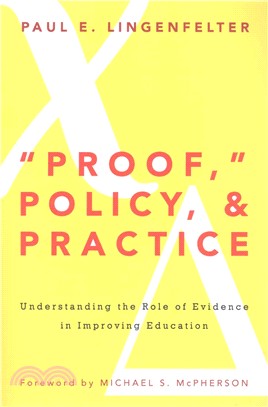Proof, Policy and Practice ─ Understanding the Role of Evidence in Improving Education
商品資訊
ISBN13:9781579227517
出版社:Stylus Pub Llc
作者:Paul E. Lingenfelter; Michael S. McPherson (FRW)
出版日:2015/12/31
裝訂/頁數:平裝/264頁
規格:23.5cm*15.9cm*1.9cm (高/寬/厚)
定價
:NT$ 2397 元無庫存,下單後進貨(到貨天數約30-45天)
下單可得紅利積點:71 點
商品簡介
相關商品
商品簡介
Researchers, policy makers, and practitioners generally are sincerely interested in improving the human condition. But they rarely work together well. Academics, longing for more influence, may wrongly fault irrationality, ideology, or ignorance for the failure of research to inform policy and practice more powerfully. Policy makers and practitioners, with some justification, may doubt that academics can deliver “what works,” a practice or method that will reliably yield desirable results.
This book aims to bridge the divide. It argues that unrealistic expectations lead to both unproductive research and impossible standards for “evidence-based” policy and practice. It offers promising ways for evidence to contribute to improvement. It analyzes the utility and limitations of the different research methods that have been applied to policy and practice, as well as the strengths and weaknesses of educational reform strategies.
In these pages educational researchers and scholars starting out on their careers can find a framework for their work: What questions are important and accessible? What methods will be fruitful? How can they help policy makers and practitioners make choices and learn how to improve? What information is relevant? What knowledge is valid and useful? How can policy makers and practitioners establish a more productive division of labor based on their respective capabilities and limitations?
Paul Lingenfelter – who has had a long and distinguished career at the Illinois Board of Higher Education, The McArthur Foundation and most recently as president of the State Higher Education Executive Officers association – presents the fruit of his experience in working to shape educational policy at the local and national levels for more than four decades.
He cautions against the illusion that straight-forward scientific approaches and data can be successfully applied to society’s most complex problems – such as educating all children or achieving widespread economic prosperity and mobility. He explains why no single program, no single policy, no simple intervention can solve complex problems, while determination, measurement, analysis, and adaptation based on evidence in specific situations can lead to significant improvement.
This is an even-handed and informative introduction to the quantitative and qualitative tools of professional social inquiry, which concludes by considering emerging practices and approaches that can help scholars, practitioners, and policy leaders become more successful in reaching their fundamental goals.
This book aims to bridge the divide. It argues that unrealistic expectations lead to both unproductive research and impossible standards for “evidence-based” policy and practice. It offers promising ways for evidence to contribute to improvement. It analyzes the utility and limitations of the different research methods that have been applied to policy and practice, as well as the strengths and weaknesses of educational reform strategies.
In these pages educational researchers and scholars starting out on their careers can find a framework for their work: What questions are important and accessible? What methods will be fruitful? How can they help policy makers and practitioners make choices and learn how to improve? What information is relevant? What knowledge is valid and useful? How can policy makers and practitioners establish a more productive division of labor based on their respective capabilities and limitations?
Paul Lingenfelter – who has had a long and distinguished career at the Illinois Board of Higher Education, The McArthur Foundation and most recently as president of the State Higher Education Executive Officers association – presents the fruit of his experience in working to shape educational policy at the local and national levels for more than four decades.
He cautions against the illusion that straight-forward scientific approaches and data can be successfully applied to society’s most complex problems – such as educating all children or achieving widespread economic prosperity and mobility. He explains why no single program, no single policy, no simple intervention can solve complex problems, while determination, measurement, analysis, and adaptation based on evidence in specific situations can lead to significant improvement.
This is an even-handed and informative introduction to the quantitative and qualitative tools of professional social inquiry, which concludes by considering emerging practices and approaches that can help scholars, practitioners, and policy leaders become more successful in reaching their fundamental goals.
主題書展
更多
主題書展
更多書展今日66折
您曾經瀏覽過的商品
購物須知
外文書商品之書封,為出版社提供之樣本。實際出貨商品,以出版社所提供之現有版本為主。部份書籍,因出版社供應狀況特殊,匯率將依實際狀況做調整。
無庫存之商品,在您完成訂單程序之後,將以空運的方式為你下單調貨。為了縮短等待的時間,建議您將外文書與其他商品分開下單,以獲得最快的取貨速度,平均調貨時間為1~2個月。
為了保護您的權益,「三民網路書店」提供會員七日商品鑑賞期(收到商品為起始日)。
若要辦理退貨,請在商品鑑賞期內寄回,且商品必須是全新狀態與完整包裝(商品、附件、發票、隨貨贈品等)否則恕不接受退貨。
























